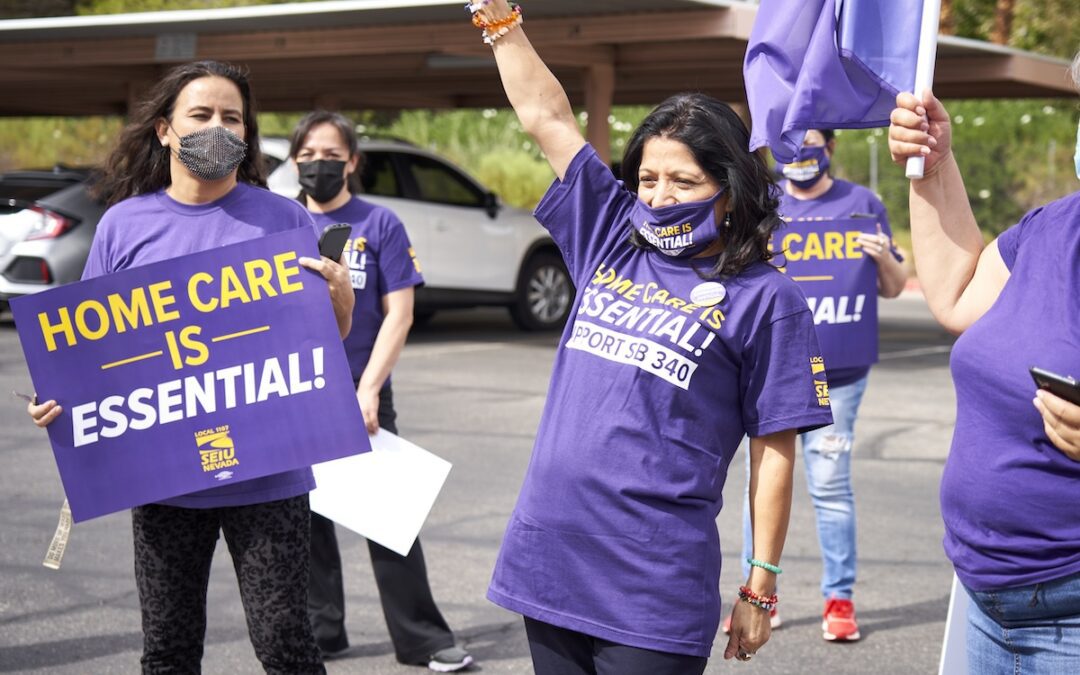
Photo via Getty Images
The Inflation Reduction Act is “the most important piece of health legislation since the Affordable Care Act,” said Merith Basey, executive director of Patients For Affordable Drugs, a nonprofit that advocates for affordable prescription drugs. “It is already having a huge impact on millions of patients in this country.”
It’s been nearly two years since the Biden-Harris administration passed the Inflation Reduction Act into law. Since then, the law’s provisions on prescription drugs have lowered prices for Medicare users across the country, including thousands of Nevadans.
Nearly 600,000 Nevadans are enrolled in Medicare, and over 470,000 of those patients are enrolled in Medicare Part D coverage, according to the Center for Medicare and Medicaid Services.
As a result of the Inflation Reduction Act, all of those Nevada seniors on Medicare who rely on insulin will no longer pay more than $35 per month for the medication, and Part D enrollees also have access to free vaccines. More cost-reducing benefits are set to come, too.
Starting next year, Medicare Part D enrollees will no longer pay any more than $2,000 out-of-pocket for prescription drugs, and starting in 2026, the price of 10 high-cost prescription drugs will be drastically reduced for seniors, thanks to a clause in the law that allows Medicare to negotiate with drug companies to lower the prices of prescription drugs covered by the program. Another 15 drugs will be selected for negotiation and see their prices decrease in 2027, with 15 more following in 2028, and 20 more in 2029 and each year afterwards.
The Inflation Reduction Act is “the most important piece of health legislation since the Affordable Care Act,” said Merith Basey, executive director of Patients For Affordable Drugs, a nonprofit that advocates for affordable prescription drugs. “It is already having a huge impact on millions of patients in this country. This was long-awaited relief for people on Medicare specifically.”
Basey said the organization has “35,000 patient stories in every single state, including Nevada, and a community of over 700,000 people—allies who are fighting to lower drug prices.”
One of those patient stories belongs to 63-year-old Nevadan Robin Hutchinson, who benefited directly from the cap on insulin products for her diabetes, Basey said.
Hutchinson will also benefit from the prescription drug negotiation provision of the Inflation Reduction Act, as a blood thinner she takes that’s currently priced at $600 a month is expected to be reduced to about $123 a month, according to Basey.
During a recent press call, Nevada senior Donna West also highlighted the positive impacts of the law. West shared that her husband, who had been on Warfarin to treat his irregular heartbeat, experienced complications from the drug and had to go to the hospital for an emergency visit. His doctor then recommended he start taking Xeralto instead, which would be a better treatment for his condition. But when West’s husband learned how much Xeralto cost — $141 per month — he wanted to go back on Warfarin.
Now, however, Xeralto is one of the 10 drugs Medicare is negotiating prices on, and between that and the $2,000 cap on drug costs, West now has hope that she and her husband will be able to afford to give him the proper care he needs.
“Now, both of us know that when we go to the doctor, our first question doesn’t have to be ‘And how much is this going to cost?’” West said in June.
It’s not just patients who will benefit, either. The Congressional Budget Office estimates that the new Medicare negotiation provision will save taxpayers $160 billion by reducing how much Medicare pays for drugs.
Chris Cochran, UNLV professor of healthcare policy and administration and chair in the Department of Healthcare Administration and Policy in the School of Public Health, highlighted how federal policies like the Inflation Reduction Act are effective in reducing the costs of healthcare.
“Well, obviously it’s going to reduce the cost,” Cochran said. “We saw that prescription drug pricing was getting out of control and there was a lot of concern, particularly for those folks who had diabetes, who needed the insulin products.”
Despite the many positive impacts of the Inflation Reduction Act, Cochran and Basey both said more work still needs to be done for American medical patients.
“It’s only a partial solution,” Cochran said. “It’s not comprehensive and right now it’s not targeting all drugs.”
Cochran said that he still encourages patients on expensive prescription drugs to seek out any possible rebate programs, discount plans, or generic alternatives to save money.
Though the Inflation Reduction Act set up rebates for Medicare Part B drugs whose prices increased faster than inflation, it still does not cover all American consumers.
“We need it to go further,” Basey said. “I can say that one of the challenges that we face with Medicare negotiation is that pharma doesn’t want to give up its monopoly power to dictate prices to Americans.”

New strain of bird flu is detected in a Nevada dairy worker, CDC says
By Mike Stobbe and Jonel Aleccia According to state health officials, the dairy worker was exposed at a farm in Churchill County, in the west...

Wage increase shows early success in stabilizing Nevada home care workforce
Seniors have officially outnumbered children for the first time in US history. But Nevada's new minimum wage increase for care workers offers a...

Registró Nevada Health Link un récord de inscripciones en su período de inscripción abierta de 2025
Se inscribieron más de 110.000 nevadenses, lo que supone la inscripción más numerosa en la historia del mercado en Nevada. Nevada Health Link logró...

Feds approve Nevada public option health insurance plans
In becoming the third state to offer publicly-available health care plans, officials say residents can soon expect lower premiums and improved...

Nevada seniors’ drug costs are now capped at $2,000 per year
The out-of-pocket cost of prescription drugs for Medicare Part D enrollees is now capped at $2,000 per year, thanks to President Joe Biden’s...

Santa Claus celebró Navidad en el hospital Intermountain; recién nacidos reciben una gigantesca bota navideña
Santa Claus hizo entregas especiales a bebés recién nacidos en un centro hospitalario cumpliendo así 15 años de una hermosa tradición decembrina....




